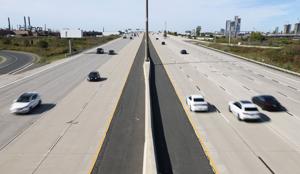Top Stories
Toronto Drivers Speed Amid Vandalism of Speed Cameras: Urgent Insights

UPDATE: A disturbing trend is emerging in Toronto as speed cameras face increasing vandalism, with 16 cameras attacked in one night earlier this week. Late-night footage shows sparks flying as a speed camera is destroyed on Parkside Drive, raising urgent questions about driver behavior and public safety.
The debate intensifies over the effectiveness of these cameras, with some residents supporting them as crucial deterrents against speeding, while others, including Premier Doug Ford, label them as a “tax grab.” This conflict comes at a time when nearly 70 percent of Canadians admit to occasionally exceeding speed limits in residential areas, according to a 2024 Canadian Automobile Association survey.
Experts are diving deep into the psychology behind this need for speed. According to Steve Joordens, a psychology professor at the University of Toronto Scarborough, “Speeding never saves you a whole lot of time in the grand scheme of things.” Yet, pressures from being late can lead drivers to speed, especially when roads are less congested.
Moreover, feelings of stress and unease are major contributors to speeding. Judith Andersen, a psychology professor at the University of Toronto Mississauga, explains that anxiety about being late or navigating tricky weather conditions can subconsciously push drivers to accelerate. “Anger and frustration also arise from a state of unease,” she noted, highlighting how stress affects driving behavior.
As more Torontonians normalize driving 10 kilometers over the speed limit, the lack of enforcement creates a dangerous cycle. Joordens argues that without regular police checks, drivers feel incentivized to speed, further embedding this behavior into the city’s culture.
The psychological phenomenon known as the Dunning-Kruger effect is also at play, particularly among younger males. Many overestimate their driving skills, leading to riskier behavior on the roads. Research shows that this overconfidence is tied to a higher likelihood of speeding.
Thrill-seeking behavior contributes significantly to this trend. Joordens pointed out that young drivers often chase the adrenaline rush that comes from speeding, which can lead to lifelong habits, even as they age.
With the recent vandalism of speed cameras, many drivers may feel justified in their actions. Joordens explains that when lax enforcement makes speeding feel normal, receiving a ticket can seem unfair, inciting anger. The delay in ticket notifications can compound this frustration, as many drivers may not be aware of their infractions until they receive multiple tickets.
While authorities maintain that speed cameras are effective in deterring speeding, the conversation is heating up about their implementation and penalties. Joordens suggests that a less punitive approach, like providing warnings, could achieve the same behavioral changes without inciting public anger.
As the situation develops, Toronto police are ramping up surveillance on speed cameras to prevent further vandalism. Commuters are left to navigate a city where the tension between speeding and law enforcement is palpable. The impact of these psychological factors and public sentiment will continue to shape the conversation around road safety in Toronto.
What happens next? Residents and officials alike are urged to reflect on the implications of this ongoing conflict and consider how best to ensure safety on the roads amid rising tensions.
Stay tuned for further updates as this situation evolves.
-

 World3 months ago
World3 months agoScientists Unearth Ancient Antarctic Ice to Unlock Climate Secrets
-

 Entertainment3 months ago
Entertainment3 months agoTrump and McCormick to Announce $70 Billion Energy Investments
-

 Lifestyle3 months ago
Lifestyle3 months agoTransLink Launches Food Truck Program to Boost Revenue in Vancouver
-

 Science3 months ago
Science3 months agoFour Astronauts Return to Earth After International Space Station Mission
-

 Technology2 months ago
Technology2 months agoApple Notes Enhances Functionality with Markdown Support in macOS 26
-

 Top Stories2 weeks ago
Top Stories2 weeks agoUrgent Update: Fatal Crash on Highway 99 Claims Life of Pitt Meadows Man
-

 Sports3 months ago
Sports3 months agoSearch Underway for Missing Hunter Amid Hokkaido Bear Emergency
-

 Politics3 months ago
Politics3 months agoUkrainian Tennis Star Elina Svitolina Faces Death Threats Online
-

 Technology3 months ago
Technology3 months agoFrosthaven Launches Early Access on July 31, 2025
-

 Politics3 months ago
Politics3 months agoCarney Engages First Nations Leaders at Development Law Summit
-

 Entertainment3 months ago
Entertainment3 months agoCalgary Theatre Troupe Revives Magic at Winnipeg Fringe Festival
-

 Politics2 weeks ago
Politics2 weeks agoShutdown Reflects Democratic Struggles Amid Economic Concerns





















